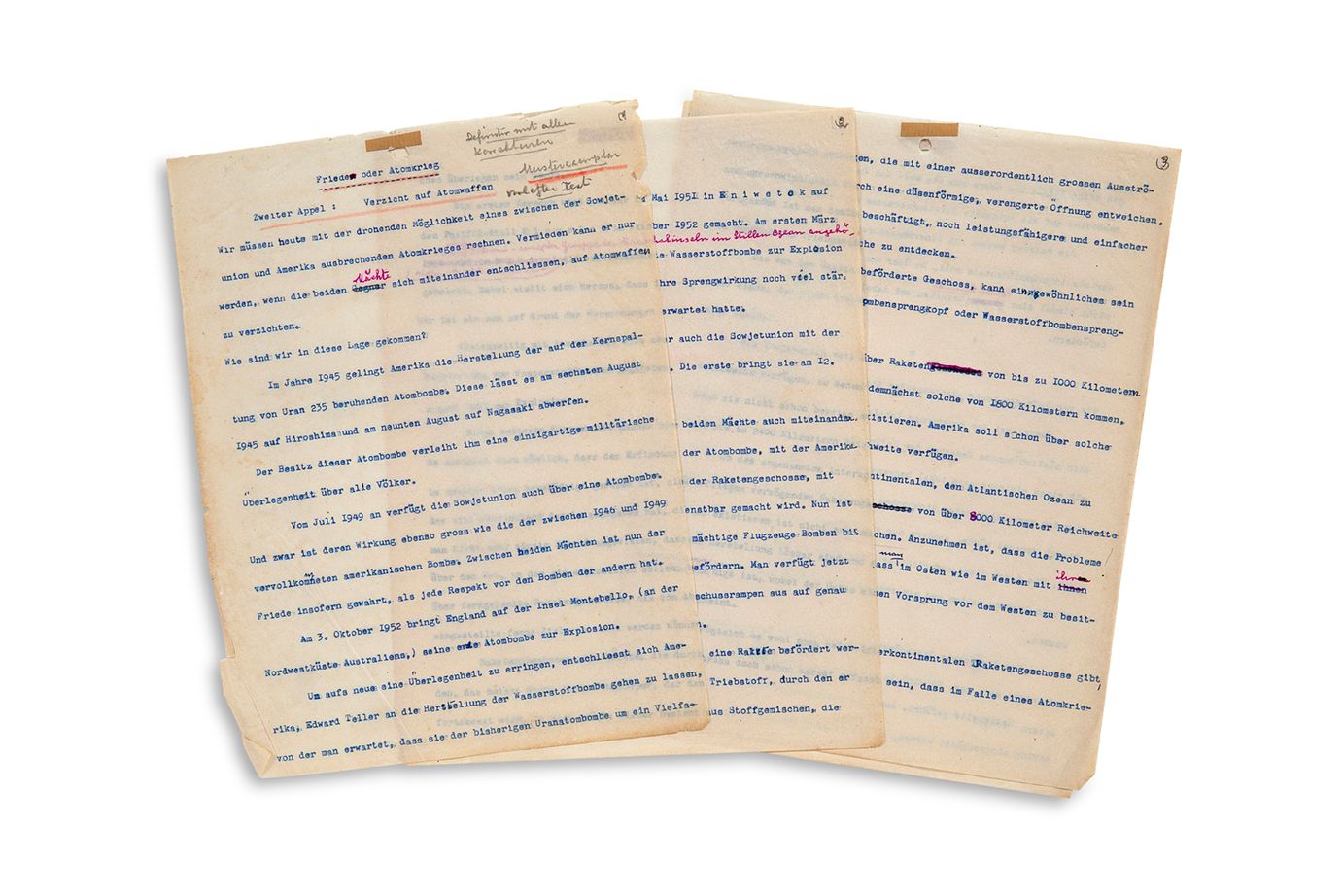Description
SCHWEITZER Albert (1875-1965) médecin et musicien.
TAPUSCRIT with autograph CORRECTIONS, Friede oder Atomkrieg, [ca. 1957-1958]; 19 pages in-4 typewritten; in German. Second appeal of his campaign against the atomic bomb. On April 23, 1957, Radio Oslo broadcast Albert Schweitzer's Appeal to Humanity . This appeal was broadcast by 140 other stations around the world. In many countries, both in the East and in the West, governments had forbidden this broadcast. Schweitzer was always looking for more material on the subject and corresponded with well-known scientists and friends, such as Bertrand Russell, Pablo Casals and Norman Cousins. On January 14, 1958, when Schweitzer was 83 years old, the chemist and Nobel Prize winner Linus Pauling handed over to the UN in New York a petition signed by 9236 scientists, including Albert Schweitzer, with the demand to sign an agreement to stop nuclear testing. In the meantime, Schweitzer prepared three new appeals: "The renunciation of nuclear experiments", "The danger of atomic war", "Negotiations at the summit", the texts of which were read by Gunnar Jahn, president of the Norwegian Nobel Prize Committee, during radio broadcasts on April 28, 29 and 30, 1958 on Radio Oslo, with a great worldwide echo. These three texts were published the same year in many countries, in France by Albin Michel under the title Paix ou guerre atomique (Peace or Atomic War). This typescript shows numerous corrections and additions by hand, mainly in red pen. This second appeal is entitled Verzicht aud Atomwaffen (Renunciation of Nuclear Weapons), which will later be changed to "Le Danger d'une guerre atomique" (The Danger of an Atomic War), for insertion in the book. We give a summary here. Although the intercontinental rocket is not yet complete, America must be prepared for submarines to fire such a projectile far into the country. These rockets are advancing at immense speed. It is expected that an intercontinental rocket will take no more than half an hour to cross the ocean with bomb loads of one to five tons... How would an atomic war be fought today? The so-called local war will become a global war... It is therefore quite possible that in a future atomic war both rocket projectiles and large bombers will be used together. Rocket projectiles will not replace bombers, but rather complement them... President Eisenhower pointed out, after observing maneuvers in the event of an atomic attack, that defensive measures in a future atomic war become unnecessary. Under these circumstances, one can only pray... In an atomic war, there would be no winner and no loser. In such a bombing, both sides would suffer the same fate. Continuous destruction would take place and no armistice or peace proposal could stop it... Whoever uses atomic weapons to defend freedom would also suffer destruction. Those who fight an atomic war for freedom will die or end their lives miserably. Instead of freedom, they will find destruction. The radioactive clouds resulting from a war between East and West would endanger humanity everywhere. There would be no need to use the remaining stock of atomic and H-bombs (there are about 50,000 of them.) An atomic war is therefore the most senseless and insane act that can take place. It must be prevented at all costs... The risk of an atomic war is increased by the fact that no warning would be given in the event of the outbreak of such a war, which would arise from a simple incident. The side that attacks first would have the initial advantage over the side that is attacked, which would suddenly suffer losses that would considerably reduce its fighting capacity... The attitude of the United States towards the renunciation of atomic weapons is remarkable. It cannot be otherwise - its conviction is that they should be banned, but at the same time, in case this does not happen, it is striving with other NATO countries to put itself in the most favorable military situation... A ray of light in this darkness - in December 1957, the Polish Foreign Minister, Rapacki, proposed that Czechoslovakia, East Germany and West Germany constitute a zone free of atomic weapons. If this proposal is accepted and these bomb-free zones could be extended to neighboring countries, peacekeeping would be assured. The beginning of the end of the spectre hanging over the Soviet Union would become a fait accompli. Public opinion in Europe is in full agreement with this sensible proposal. It has become convinced in recent months that under no circumstances should Europe become the battleground of an atomic war between the Soviet Union and the United States. The time has passed when a European country could
159
SCHWEITZER Albert (1875-1965) médecin et musicien.
